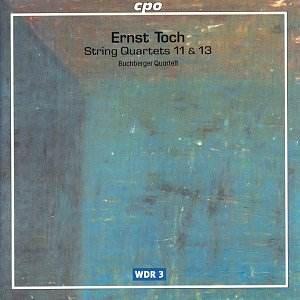Ernst Toch’s musical training was minimal. By literally
copying out the scores of Mozart String Quartets he found that Mozart
‘not only replaced ... every living teacher but outdid them all’. Initially,
he composed in secret, but in 1909 he won the Mozart Prize and a musical
career seemed inevitable. He attained a teaching position at the Mannheim
Music Academy in 1913, leaving only in 1929 to go to Berlin. But things
were to go awry with the rise of anti-Semitism and he made his way to
Los Angeles where the popularity and respect he had been accorded in
Berlin were never to return. His rate of composition fell dramatically
and he wrote only eight works between 1933 and 1945 (as opposed to more
than 35 between 1919 and 1933). Eventually, in 1948 he suffered a heart
attack that led to a reassessment of his Weltanschauung and a
renewed burst of activity, writing seven symphonies within a short period.
Toch’s initial experiences with the Mozart String Quartets
left an indelible mark, and there is a freedom of invention in the two
quartets on this disc that makes repeated playing a necessity. When
I first heard the Eleventh Quartet, it made such an impression that
after playing it, I immediately had to hear it again. And several hearings
later, there still appears to be an endless store of riches ahead. This
piece was written in response to a commission from Hindemith for the
Donauschingen Music Festival of 1924. Its stature was quickly recognized
and it was repeatedly taken up by quartets on both sides of the Atlantic.
The expressionist lyricism of the first movement is
frequently reminiscent of the music of Alban Berg. It exhibits similar
sorts of yearning, aching lines, not to mention ferocious difficulties
for the performers The Buchberger Quartet triumph over the technical
and rhythmic challenges to go straight to the angst which lies
at the heart of this piece. The third movement's concentration is close
to that inherent in the late Beethoven Quartets, while the final Allegro
molto is imbued with Bartókian energy.
The String Quartet No. 13 was commissioned by the Coleman
Chamber Music Association of Pasadena in 1953. It is based on Toch’s
individual response to dodecaphony, a procedure about which he had initially
harboured doubts. It is certainly not based on pure Schoenbergian principles
– the first subject of the first movement is a sequence of five tone
rows in sequence, for example. It is really a virtuoso act of serial
thought. The shadow of Beethoven is also here, however, in the concentration
of the first part of the first movement (whereafter the music becomes
more flighty and nervous) and in the gritty determination of the last
movement.
The Buchberger Quartet brings a luminous conviction
to these performances which makes this disc unmissable. The fact that
CPO are issuing the disc at their ‘Special Price’ is just the icing
on the cake. This is a valuable addition to the Toch discography: for
further listening, String Quartets Nos. 12 and 15 are available on Talent
DOM32 (played by the Brande String Quartet), and the Second and Third
Symphonies are also on CPO played by the Berlin Radio Symphony Orchestra
under Alun Francis (999 705-2).
Colin Clarke

![]() Buchberger String Quartet.
Buchberger String Quartet. ![]() CPO 999 687-2 [55.35]
CPO 999 687-2 [55.35]